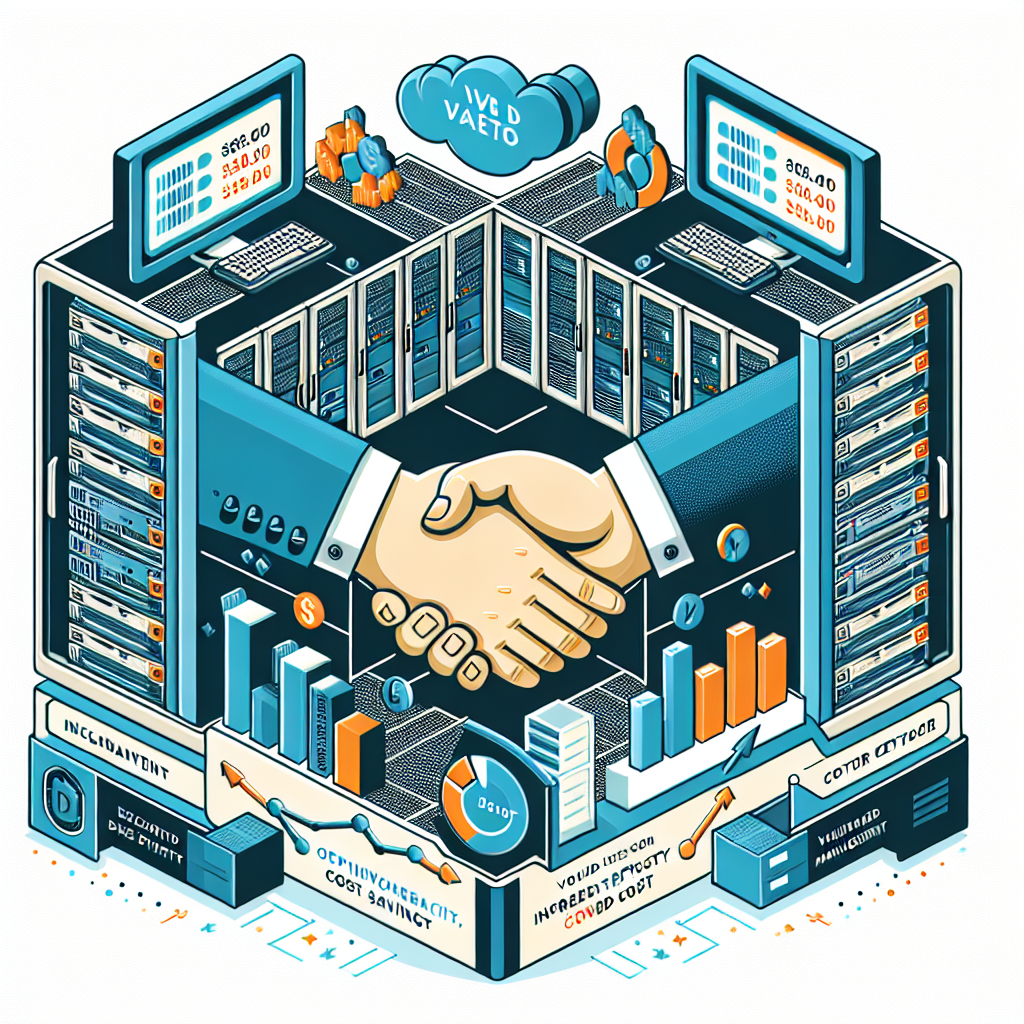Your cart is currently empty!
Tag: Data Center Vendor Management

The Role of Vendor Management in Data Center Efficiency
In today’s digital age, data centers play a crucial role in the operations of businesses of all sizes. These facilities house the servers, storage devices, and networking equipment that store and process vast amounts of data. As data center operations become increasingly complex and critical to business success, the role of vendor management in ensuring efficiency and reliability has become more important than ever.Vendor management in the context of data centers refers to the oversight and coordination of relationships with vendors who provide products and services that support the operations of the facility. This includes hardware and software vendors, as well as service providers such as colocation facilities, cloud providers, and managed service providers.
Effective vendor management is essential for maximizing the efficiency and reliability of a data center. By carefully selecting and managing vendors, data center managers can ensure that they have access to the best technologies and services available, and that they are able to quickly address any issues that may arise.
One of the key benefits of effective vendor management is the ability to leverage the expertise and resources of multiple vendors to optimize the performance of the data center. By working closely with vendors to design and implement solutions that meet the specific needs of the facility, data center managers can ensure that they are able to achieve maximum efficiency and reliability.
Vendor management also plays a critical role in ensuring the security of the data center. By carefully vetting vendors and implementing strict security protocols, data center managers can reduce the risk of security breaches and data loss. Additionally, by regularly monitoring and evaluating vendor performance, data center managers can quickly identify and address any security vulnerabilities that may arise.
Another important aspect of vendor management in data centers is cost control. By carefully negotiating contracts and monitoring vendor performance, data center managers can ensure that they are getting the best value for their money. This includes not only minimizing costs but also maximizing the return on investment by ensuring that vendors are delivering the promised level of service and support.
In conclusion, the role of vendor management in data center efficiency cannot be overstated. By carefully selecting and managing vendors, data center managers can optimize performance, enhance security, and control costs. In today’s rapidly evolving business environment, effective vendor management is essential for ensuring the success of data center operations.

Maximizing ROI: Strategies for Optimizing Data Center Vendor Relationships
In today’s fast-paced business environment, data centers play a crucial role in ensuring the smooth operation of various IT systems and applications. As companies increasingly rely on data centers to store and process their data, optimizing vendor relationships has become essential for maximizing return on investment (ROI) and ensuring operational efficiency.Data center vendor relationships are critical for businesses of all sizes, as they help ensure that companies have access to the latest technology and support services needed to keep their data centers running smoothly. By strategically managing these relationships, businesses can not only reduce costs but also improve performance and reliability.
Here are some strategies for optimizing data center vendor relationships to maximize ROI:
1. Establish clear communication channels: Communication is key to any successful relationship, and this is especially true when it comes to data center vendors. Make sure to establish regular communication channels with your vendors to ensure that both parties are on the same page regarding expectations, project timelines, and any issues that may arise.
2. Set performance metrics and benchmarks: Define clear performance metrics and benchmarks for your data center vendors to ensure that they are meeting your business needs and delivering value for money. Regularly review these metrics to track progress and identify areas for improvement.
3. Negotiate competitive pricing: Negotiating competitive pricing with data center vendors can help reduce costs and increase ROI. Compare quotes from multiple vendors and leverage your existing relationships to secure the best possible deals.
4. Develop a strong partnership: Building a strong partnership with your data center vendors can help foster trust, collaboration, and mutual understanding. Work closely with your vendors to identify opportunities for innovation, optimization, and cost savings.
5. Conduct regular vendor reviews: Conduct regular reviews of your data center vendors to assess their performance, address any issues or concerns, and identify areas for improvement. Use these reviews to provide feedback and ensure that vendors are meeting your business needs.
By implementing these strategies for optimizing data center vendor relationships, businesses can maximize ROI, improve operational efficiency, and ensure that their data centers are running at peak performance. With the right approach and commitment to collaboration, companies can build strong, mutually beneficial relationships with their data center vendors that drive long-term success.
Optimizing Performance and Reliability with Effective Data Center Vendor Management
In today’s fast-paced digital world, data centers play a crucial role in ensuring the smooth operation of businesses and organizations. These facilities house the servers, storage devices, and networking equipment that store and process large amounts of data, enabling companies to run their operations efficiently. However, managing a data center can be a complex and challenging task, requiring careful planning and oversight to ensure optimal performance and reliability.One key aspect of data center management is vendor management. Data centers rely on a wide range of vendors for equipment, software, and services, and effective vendor management is essential for optimizing performance and reliability. By working closely with vendors and building strong relationships, data center managers can ensure that their facilities are equipped with the latest technology and supported by reliable services.
There are several strategies that data center managers can use to optimize performance and reliability through effective vendor management. First and foremost, it is important to carefully evaluate and select vendors that offer high-quality products and services. By conducting thorough research and due diligence, data center managers can identify vendors that have a proven track record of delivering reliable and cost-effective solutions.
Once vendors have been selected, it is essential to establish clear communication channels and expectations. Data center managers should work closely with vendors to define service level agreements (SLAs) and performance metrics, and regularly monitor and evaluate vendor performance against these benchmarks. By setting clear expectations and holding vendors accountable, data center managers can ensure that their facilities are well-supported and maintained.
In addition to monitoring vendor performance, data center managers should also proactively engage with vendors to stay informed about new technologies and industry trends. By staying up-to-date on the latest developments in data center technology, managers can identify opportunities to enhance performance and reliability through new products and services.
Another key aspect of effective vendor management is building strong relationships with vendors. By fostering a collaborative and mutually beneficial partnership, data center managers can leverage vendors’ expertise and resources to optimize performance and reliability. Building relationships with vendors can also help data center managers navigate challenges and resolve issues quickly and effectively.
Ultimately, effective vendor management is essential for optimizing performance and reliability in data centers. By carefully selecting vendors, establishing clear expectations, staying informed about new technologies, and building strong relationships, data center managers can ensure that their facilities are equipped with the best possible solutions and supported by reliable services. By prioritizing vendor management, data center managers can improve the efficiency and effectiveness of their operations, ultimately driving business success.

Ensuring Compliance and Security in Data Center Vendor Relationships
In today’s digital age, data centers play a critical role in storing, processing, and managing vast amounts of data for businesses of all sizes. With the increasing reliance on data centers, ensuring compliance and security in vendor relationships has become a top priority for organizations to protect sensitive information and maintain regulatory standards.When partnering with a data center vendor, companies must conduct thorough due diligence to ensure that the vendor complies with industry regulations and best practices. This includes verifying that the data center has the necessary certifications, such as ISO 27001 for information security management, SOC 2 for data processing integrity, and PCI DSS for payment card data security.
Additionally, companies should assess the vendor’s physical security measures, such as access controls, surveillance systems, and environmental controls to prevent unauthorized access and protect against physical threats. It is also essential to review the vendor’s disaster recovery and business continuity plans to ensure that data remains secure and accessible in the event of a disruption.
In terms of contractual agreements, organizations should include specific provisions related to data security, compliance, and auditing in their contracts with data center vendors. This includes outlining the vendor’s responsibilities for safeguarding data, reporting security incidents, and allowing for regular audits to verify compliance with agreed-upon standards.
Regular monitoring and oversight of vendor activities are crucial to ensuring compliance and security in data center relationships. Companies should conduct periodic reviews of the vendor’s security controls, performance metrics, and incident response procedures to identify any potential vulnerabilities or gaps in security.
In the event of a security breach or non-compliance issue, organizations should have clear escalation procedures in place to address the issue promptly and effectively. This may include notifying regulatory authorities, conducting forensic investigations, and taking corrective action to mitigate the impact of the breach.
Overall, ensuring compliance and security in data center vendor relationships requires a proactive approach that involves thorough due diligence, clear contractual agreements, regular monitoring, and effective incident response protocols. By taking these steps, organizations can protect their data and maintain trust with their customers, partners, and regulatory authorities in an increasingly complex and interconnected digital environment.

Harnessing Innovation Through Collaborative Data Center Vendor Partnerships
In today’s rapidly evolving technology landscape, data centers play a crucial role in supporting the digital infrastructure of businesses around the world. As the demand for computing power, storage, and networking capabilities continues to grow, data center operators are constantly looking for innovative solutions to optimize their operations and stay ahead of the competition.One effective way to harness innovation in the data center space is through collaborative partnerships with vendors. By working closely with technology suppliers, data center operators can leverage their expertise, resources, and cutting-edge solutions to drive efficiency, improve performance, and enhance the overall customer experience.
One of the key benefits of collaborative vendor partnerships is access to a wide range of innovative technologies and solutions. Vendors are constantly developing new products and services that can help data center operators improve their infrastructure, increase scalability, and reduce costs. By partnering with vendors, data center operators can stay at the forefront of technological advancements and ensure that their facilities are equipped with the latest and most effective solutions.
Collaborative vendor partnerships also enable data center operators to tap into the expertise and knowledge of their suppliers. Vendors often have a deep understanding of the latest trends, best practices, and industry standards in the data center space. By working closely with vendors, data center operators can gain valuable insights and guidance on how to optimize their operations, improve performance, and address any challenges or issues that may arise.
Furthermore, collaborative vendor partnerships can help data center operators streamline their procurement processes and reduce time-to-market for new projects. By establishing strong relationships with vendors, data center operators can benefit from faster access to products and services, better pricing and discounts, and more efficient delivery and implementation processes. This can ultimately help data center operators accelerate their innovation efforts and stay competitive in a fast-paced market.
In conclusion, harnessing innovation through collaborative data center vendor partnerships is essential for data center operators looking to stay ahead in a rapidly changing technology landscape. By working closely with vendors, data center operators can access cutting-edge solutions, leverage vendor expertise, and streamline their procurement processes to drive efficiency, improve performance, and enhance the overall customer experience. Collaborative vendor partnerships are a powerful tool for data center operators to stay at the forefront of technological advancements and achieve long-term success in the digital age.

Optimizing Cost Savings with Efficient Data Center Vendor Management
In today’s fast-paced digital world, data centers play a crucial role in ensuring the smooth operation of businesses. However, managing a data center can be a costly affair, with expenses ranging from infrastructure maintenance to energy consumption. This is where efficient data center vendor management comes into play, helping businesses optimize cost savings and maximize efficiency.Data center vendor management involves the oversight and coordination of various vendors who provide services and products to the data center. By efficiently managing these vendors, businesses can ensure that they are getting the best value for their money while maintaining high standards of performance and reliability.
One of the key ways to optimize cost savings with efficient data center vendor management is by conducting regular vendor assessments. This involves evaluating the performance and reliability of each vendor to determine if they are meeting the business’s needs and expectations. By identifying underperforming vendors, businesses can make informed decisions about whether to renegotiate contracts, seek alternative vendors, or consolidate services to reduce costs.
Another important aspect of efficient data center vendor management is negotiating contracts with vendors to secure the best possible pricing and terms. By leveraging the buying power of the business and establishing clear performance metrics, businesses can negotiate favorable contracts that help reduce costs and improve service quality.
Furthermore, businesses can optimize cost savings by implementing vendor management software that automates and streamlines the vendor management process. This software can help businesses track vendor performance, manage contracts, and monitor expenses, enabling them to make data-driven decisions that lead to cost savings and improved efficiency.
Additionally, businesses can optimize cost savings by consolidating vendors and services to reduce complexity and streamline operations. By working with a smaller number of trusted vendors, businesses can negotiate better pricing and service agreements, leading to cost savings and improved service quality.
In conclusion, optimizing cost savings with efficient data center vendor management is essential for businesses looking to maximize efficiency and reduce expenses. By conducting regular vendor assessments, negotiating contracts, implementing vendor management software, and consolidating vendors, businesses can achieve significant cost savings while maintaining high standards of performance and reliability in their data center operations.

Mitigating Risks Through Proactive Data Center Vendor Management
In today’s digital age, data centers have become the backbone of countless businesses, housing valuable information and critical systems. With the increasing reliance on data centers, it is essential for organizations to prioritize vendor management to mitigate risks and ensure smooth operations.Proactive data center vendor management is the process of actively monitoring and managing relationships with data center service providers to minimize risks and maximize performance. By taking a proactive approach, organizations can identify and address potential issues before they escalate, ultimately protecting their data and ensuring business continuity.
One of the key benefits of proactive data center vendor management is risk mitigation. By closely monitoring vendor performance and compliance with service level agreements, organizations can identify and address potential vulnerabilities before they result in downtime or data loss. This proactive approach helps to minimize the impact of potential disruptions and ensures that data center operations remain secure and reliable.
Another advantage of proactive vendor management is improved performance. By working closely with data center service providers, organizations can optimize their infrastructure and ensure that it meets their specific needs and requirements. This level of collaboration can lead to cost savings, improved efficiency, and enhanced performance, ultimately benefiting the organization as a whole.
Furthermore, proactive vendor management can also help organizations stay ahead of emerging technologies and trends in the data center industry. By fostering strong relationships with service providers, organizations can gain insights into new technologies and best practices, allowing them to stay competitive and adapt to changing market conditions.
In order to effectively mitigate risks through proactive data center vendor management, organizations should establish clear communication channels with service providers, regularly review performance metrics, and conduct regular audits to ensure compliance with industry standards and regulations. By staying proactive and vigilant, organizations can protect their data, optimize their infrastructure, and stay ahead of the curve in the ever-evolving data center landscape.

Ensuring Data Center Vendor Compliance and Security
Data centers play a crucial role in the functioning of any organization, as they store and manage vast amounts of data critical to business operations. With the increasing reliance on technology and the rise of cyber threats, ensuring data center vendor compliance and security has become more important than ever.Data center vendors are third-party providers that offer services such as data storage, processing, and networking. They are entrusted with sensitive information, making it essential to ensure they meet compliance regulations and maintain robust security measures.
One of the key aspects of ensuring data center vendor compliance is conducting thorough due diligence before selecting a vendor. This involves evaluating the vendor’s reputation, track record, and compliance certifications. It is crucial to choose a vendor that adheres to industry standards such as ISO 27001, SOC 2, and HIPAA, depending on the nature of the data being stored.
In addition to certifications, organizations should also assess the vendor’s security measures and protocols. This includes physical security, such as access controls and surveillance systems, as well as cybersecurity measures like encryption, firewalls, and intrusion detection systems. Regular audits and assessments should be conducted to ensure ongoing compliance and security.
Furthermore, organizations should establish clear contractual agreements with data center vendors that outline expectations regarding compliance and security. This includes clauses related to data protection, breach notification, and liability in the event of a security incident. Regular monitoring and reporting mechanisms should be established to ensure vendors are meeting their obligations.
It is also essential to establish a strong incident response plan in collaboration with data center vendors. This plan should outline the steps to be taken in the event of a security breach, including communication protocols, containment measures, and recovery procedures. Regular drills and simulations should be conducted to test the effectiveness of the plan.
In conclusion, ensuring data center vendor compliance and security is a critical aspect of protecting sensitive data and maintaining business continuity. By conducting thorough due diligence, implementing robust security measures, and establishing clear contractual agreements, organizations can mitigate the risks associated with third-party data center providers. Regular monitoring, audits, and incident response planning are essential to maintaining a secure and compliant data center environment.

How to Evaluate and Select the Right Data Center Vendors
In today’s digital age, data centers play a crucial role in the operations of businesses. They are responsible for storing and managing large amounts of data, ensuring its security and availability. As such, choosing the right data center vendor is a critical decision for any organization. With so many options available in the market, it can be overwhelming to evaluate and select the right vendor. Here are some key factors to consider when making this important decision:1. Reliability and uptime: The primary function of a data center is to ensure the availability of data. Therefore, it is essential to choose a vendor that has a proven track record of reliability and uptime. Look for vendors that offer Service Level Agreements (SLAs) guaranteeing a certain level of uptime, typically 99.9% or higher.
2. Security measures: Data security is paramount in today’s business environment, especially with the rise of cyber threats. Evaluate potential vendors based on the security measures they have in place, such as physical security, access controls, encryption, and data backup protocols. Ensure that the vendor complies with industry standards and regulations, such as ISO 27001 and GDPR.
3. Scalability and flexibility: As your business grows, your data center needs may change. Choose a vendor that can scale with your business and accommodate any future growth. Look for vendors that offer flexible solutions, such as cloud-based services, to adapt to changing needs.
4. Location and proximity: The physical location of a data center can impact the speed and reliability of data transfer. Consider the proximity of the vendor’s data centers to your business locations to minimize latency and ensure optimal performance. Additionally, evaluate the vendor’s disaster recovery and backup plans to mitigate any potential risks.
5. Cost and pricing: Cost is always a significant factor in any business decision. Compare pricing models and service offerings from different vendors to find the best value for your budget. Be sure to consider not only the upfront costs but also any hidden fees or long-term commitments.
6. Customer support and service: A reliable vendor should offer excellent customer support and service. Evaluate the vendor’s responsiveness, availability, and level of technical expertise. Consider reading reviews and testimonials from other customers to gauge their satisfaction with the vendor’s support.
7. Compliance and certifications: Data centers are subject to various regulations and industry standards, such as HIPAA and PCI DSS. Ensure that the vendor is compliant with relevant regulations and holds certifications that demonstrate their commitment to security and quality.
In conclusion, choosing the right data center vendor is a critical decision that can impact the efficiency and security of your business operations. By carefully evaluating vendors based on factors such as reliability, security, scalability, cost, and customer support, you can select a vendor that meets your specific needs and helps your business succeed in the digital age.

The Importance of Vendor Diversity in Data Center Management
In today’s fast-paced digital age, data centers play a crucial role in storing, processing, and managing vast amounts of information for businesses and organizations. With the rise of cloud computing, big data, and the Internet of Things, the demand for data center services has never been higher. As a result, data center management has become a critical function for ensuring the smooth operation of these facilities.One important aspect of data center management that is often overlooked is vendor diversity. Vendor diversity refers to the practice of working with a variety of different suppliers and service providers to ensure that a data center has access to a wide range of products, services, and expertise. This approach is important for several reasons.
First and foremost, vendor diversity helps to mitigate risk. By working with multiple vendors, data center managers can reduce their reliance on any single supplier. This is important because if a vendor experiences a disruption in service, goes out of business, or fails to deliver on their commitments, it could have a significant impact on the data center’s operations. By diversifying their vendor base, data center managers can spread out their risk and ensure that they have alternative options available in case of emergencies.
Second, vendor diversity can help to drive innovation and competitiveness. By working with a variety of vendors, data center managers can access a broader range of products and services, as well as different perspectives and approaches to problem-solving. This can help to stimulate creativity and drive continuous improvement within the data center, leading to better performance and efficiency.
Third, vendor diversity can help to promote inclusivity and equality within the data center industry. By working with a diverse range of suppliers, data center managers can support small and minority-owned businesses, as well as companies owned by women, veterans, and other underrepresented groups. This can help to create a more diverse and inclusive supply chain, which can bring new ideas and perspectives to the table and help to drive positive social change within the industry.
In conclusion, vendor diversity is a critical aspect of data center management that should not be overlooked. By working with a variety of suppliers and service providers, data center managers can mitigate risk, drive innovation, and promote inclusivity within the industry. Ultimately, vendor diversity can help to ensure the long-term success and sustainability of a data center, making it a key consideration for any organization looking to effectively manage their data center operations.
